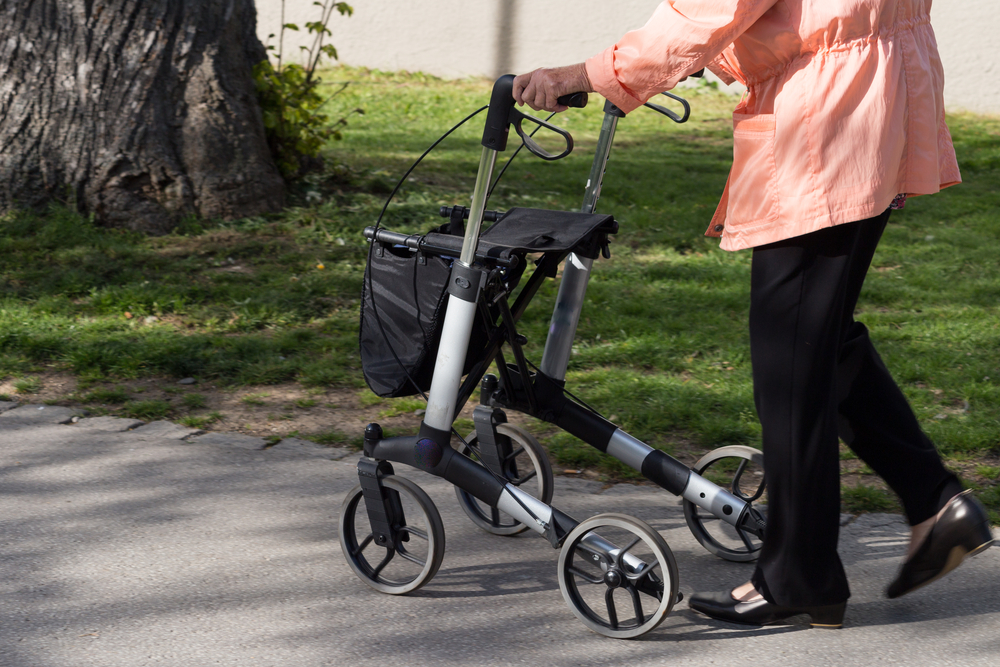Ocrevus’ Early Use May Lower Need for Walking Aid by 49% Over 6 Years
Written by |

Starting treatment with Ocrevus early can lower almost by half the need for a walking aid in people with relapsing forms of multiple sclerosis (MS) over six years, new analyses of Phase 3 trial data that compared immediate initiation with a two-year delay show.
A separate analysis also found that Ocrevus’ use can lessen damage to the thalamus, a brain region important in sensorimotor processing.
Ocrevus (ocrelizumab) is a twice-yearly infusion therapy developed by Genentech, a member of the Roche Group. It is approved by the U.S. Food and Drug Administration and across the European Union to treat adults with relapsing forms of MS (clinically isolated syndrome, relapsing-remitting MS and active secondary progressive MS), as well as those with primary progressive MS — the first therapy ever approved for PPMS.
The treatment works by targeting B-cells, immune cells that drive the inflammation that damages the nervous system in MS.
Ocrevus’ efficacy and safety in relapsing MS were demonstrated in Phase 3 clinical trials, including the OPERA I and II trials (NCT01247324 and NCT01412333). In these trials, 1,656 people with relapsing MS were randomly assigned to Ocrevus, a placebo, or Rebif (interferon beta-1a; an approved relapsing MS therapy) for 96 weeks (about two years).
Results showed that Ocrevus outperformed Rebif, with a nearly 50% relative reduction in annual relapse rates (the study’s primary efficacy measure).
Following the two-year double-blind part of these studies, people in OPERA I and II were allowed to enroll in open-label extension studies, where all were treated with Ocrevus every six months (600 mg infusion) after an initial loading dose (300 mg given two weeks apart).
Now, a new analyses of these extension studies — comprising a total of six years’ worth of data — show that, compared to patients who started on Rebif in the main trials, those who started on Ocrevus had a significantly lower risk of needing an assistive walking device (4.3% vs. 7.2%). This corresponds to a 49% lower risk of walking with an aid over six years of Ocrevus treatment.
Severe disability requiring a walking aid was defined by researchers as an Expanded Disability Status Scale (EDSS) score of 6.0 or greater. The scale, which runs from 0 to 10, defines scores of 5.0 or higher as walking impaired.
“For people with MS, maintaining mobility for as long as possible is very important,” Levi Garraway, MD, PhD, chief medical officer and head of global product development at Genentech, said in a press release. “We are encouraged by these new longer-term analyses showing that earlier initiation of Ocrevus treatment may reduce the risk of needing a walking aid by nearly 50 percent over six years.”
A separate analysis assessed thalamic atrophy (reduced size/volume of the thalamus). The thalamus, a gray matter structure at the base of the cerebrum, serves as a kind of “relay and integration center” for sensory information like sight (senses other than smell), and is involved in motor control, alertness, and cognition. It is known to be affected by damage caused to the brain with MS.
This analysis used data from the two-year double-blind period of OPERA I and II, as well as that of ORATORIO (NCT01194570), a Phase 3 clinical trial with a similar design, but which enrolled people with PPMS.
Patients who started treatment with Ocrevus in these studies’ first two years had significantly lesser thalamic atrophy than was seen in those given Rebif or a placebo. Specific values were not disclosed in the release.
Overall, these data suggest that Ocrevus treatment reduces the risk of disability and disease progression in both relapsing MS and PPMS, and that earlier and continual use bring greater benefit.
“Slowing MS progression earlier in the disease course — not just treating relapses — may bring additional clinically meaningful outcomes to people living with this disease,” Garraway said.
Safety with Ocrevus’ use in the long-term extension studies was consistent with that found in the trials’ first two years, Genentech reported in the release, with infusion site reactions and infections being the most common side effects.
These new data were selected for presentation at this year’s American Academy of Neurology (AAN) Annual Meeting, but due to the COVID-19 pandemic the meeting was canceled. Online virtual presentations will be made available instead.
Ocrevus is approved for use in a total of 90 countries, including the U.S. and EU.


